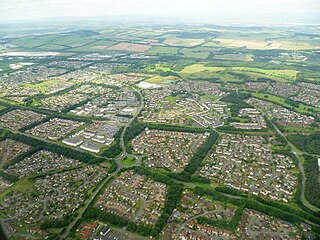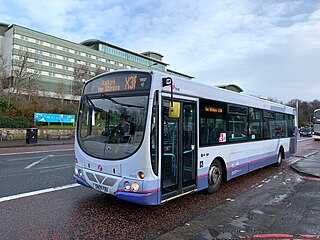
East Lothian is one of the 32 council areas of Scotland, as well as a historic county, registration county and lieutenancy area. The county was called Haddingtonshire until 1921.

Lothian is a region of the Scottish Lowlands, lying between the southern shore of the Firth of Forth and the Lammermuir Hills and the Moorfoot Hills. The principal settlement is the Scottish capital, Edinburgh, while other significant towns include Livingston, Linlithgow, Bathgate, Queensferry, Dalkeith, Bonnyrigg, Penicuik, Musselburgh, Prestonpans, Tranent, North Berwick, Dunbar and Haddington.

West Lothian is one of the 32 council areas of Scotland, bordering the City of Edinburgh council area, Scottish Borders, South Lanarkshire, North Lanarkshire and Falkirk. The modern council area was formed in 1975 when the historic county of West Lothian, also known as Linlithgowshire, was reshaped substantially as part of local government reforms; some areas that had formerly been part of Midlothian were added to a new West Lothian District within the Region of Lothian, whilst some areas in the north-west were transferred to the Falkirk District and areas in the north-east were transferred to the City of Edinburgh District. In 1996 West Lothian became a unitary authority area, using the same name and territory as in 1975.
The politics of Edinburgh are expressed in the deliberations and decisions of the City of Edinburgh Council, in elections to the council, the Scottish Parliament and the UK Parliament.

Livingston is the largest town in West Lothian, Scotland. Designated in 1962, it is the fourth post-war new town to be built in Scotland. Taking its name from a village of the same name incorporated into the new town, it was originally developed in the then-counties of Midlothian and West Lothian along the banks of the River Almond. It is situated approximately fifteen miles (25 km) west of Edinburgh and thirty miles (50 km) east of Glasgow, and is close to the towns of Broxburn to the north-east and Bathgate to the north-west.

Local government in Scotland comprises thirty-two local authorities, commonly referred to as councils. Each council provides public services, including education, social care, waste management, libraries and planning. Councils receive the majority of their funding from the Scottish Government, but operate independently and are accountable to their local electorates. Councils raise additional income via the Council Tax, a locally variable domestic property tax, and Business rates, a non-domestic property tax.

Broxburn is a town in West Lothian, Scotland. It is 12 miles (19 km) from the West End of Edinburgh, 5 miles (8.0 km) from Edinburgh Airport and 5 miles (8.0 km) to the north of Livingston. Originally a village known as Easter Strathbock in the medieval period, by 1600, the village had become known as Broxburn. The area developed rapidly during the Victorian era as a result of industrialisation related to shale oil extraction. While much of the industry in the area is now diminished, the town has continued to grow following new residential development, resulting in Broxburn forming a conurbation with neighbouring Uphall. It lies just to the south of Winchburgh.

Bathgate is a town in West Lothian, Scotland, 5 miles (8 km) west of Livingston and adjacent to the M8 motorway. Nearby towns are Linlithgow, Livingston, and West Calder. A number of villages fall under the umbrella of Bathgate, including Blackburn, Whitburn, Stoneyburn, Armadale, Torphichen and Fauldhouse.

Cockenzie and Port Seton is a unified town in East Lothian, Scotland. It is on the coast of the Firth of Forth, four miles east of Musselburgh. The burgh of Cockenzie was created in 1591 by James VI of Scotland. Port Seton harbour was built by the 11th Lord Seton between 1655 and 1665.

The Edinburgh congestion charge was a proposed scheme of congestion pricing for Scotland's capital city. It planned to reduce congestion by introducing a daily charge to enter a cordon within the inner city, with the money raised directed to fund improvements in public transport. The scheme was the subject of intense public and political debate and ultimately rejected. A referendum was held and nearly three-quarters of respondents rejected the proposals.

Lothian Thistle Hutchison Vale Football Club (LTHV) are a senior non-league football club based in Edinburgh, Scotland. Currently competing in the East of Scotland League Premier Division, they play their home matches at Saughton Enclosure in the Saughton area of the city.

Lothian Buses is a major bus operator based in Edinburgh, Scotland. It is the largest municipal bus company in the United Kingdom: the City of Edinburgh Council owns 91%, Midlothian Council 5%, East Lothian Council 3% and West Lothian Council 1%.

Edinburgh is a major transport hub in east central Scotland and is at the centre of a multi-modal transport network with road, rail and air communications connecting the city with the rest of Scotland and internationally.
Transport Scotland is the national transport agency of Scotland. It was established by the Transport (Scotland) Act 2005, and began operating on 1 January 2006 as an executive agency of the Scottish Government.

Linlithgow is a town in West Lothian, Scotland. It was historically West Lothian's county town, reflected in the county's historical name of Linlithgowshire. An ancient town, it lies in the Central Belt on a historic route between Edinburgh and Falkirk beside Linlithgow Loch. The town is situated approximately 20 miles (32 km) west of Edinburgh.

First South East & Central Scotland, formerly known as First Scotland East, was an operator of both local and regional bus services in Clackmannanshire, East Dunbartonshire, East Lothian, Falkirk, Fife, Midlothian, North Lanarkshire, Scottish Borders, Stirling and West Lothian, as well as the cities of Edinburgh and Glasgow, Scotland. It was a subsidiary of FirstGroup, which operates bus, rail and tram services across the United Kingdom and Ireland.

NHS Lothian is one of the 14 regions of NHS Scotland. It provides healthcare services in the City of Edinburgh, East Lothian, Midlothian and West Lothian council areas. Its headquarters are at Waverley Gate, Edinburgh

The Levenmouth rail link is a recently reopened 5 miles (8 km) branch line railway in Fife, Scotland. The link connects the town of Leven and other settlements in the Levenmouth conurbation with Thornton, and joins the Fife Circle Line at Thornton North Junction. The line was promoted by Fife Council and the South East Scotland Transport Partnership (SESTRAN). The plan was approved by the Scottish Government on 8 August 2019. The line was formally opened by the First Minister of Scotland, John Swinney, on 29 May 2024. Scheduled passenger services began on 2 June 2024.

Midlothian North and Musselburgh is a constituency of the Scottish Parliament (Holyrood) covering parts of the council areas of Midlothian and East Lothian. It elects one Member of the Scottish Parliament (MSP) by the plurality method of election. It is one of nine constituencies in the Lothian electoral region, which elects seven additional members, in addition to the nine constituency MSPs, to produce a form of proportional representation for the region as a whole.

The City of Edinburgh Council is the local government authority covering the City of Edinburgh council area. Almost half of the council area is the built-up area of Edinburgh, capital of Scotland. With a population of 514,990 in 2022, it is the second most populous local authority area in Scotland.
















